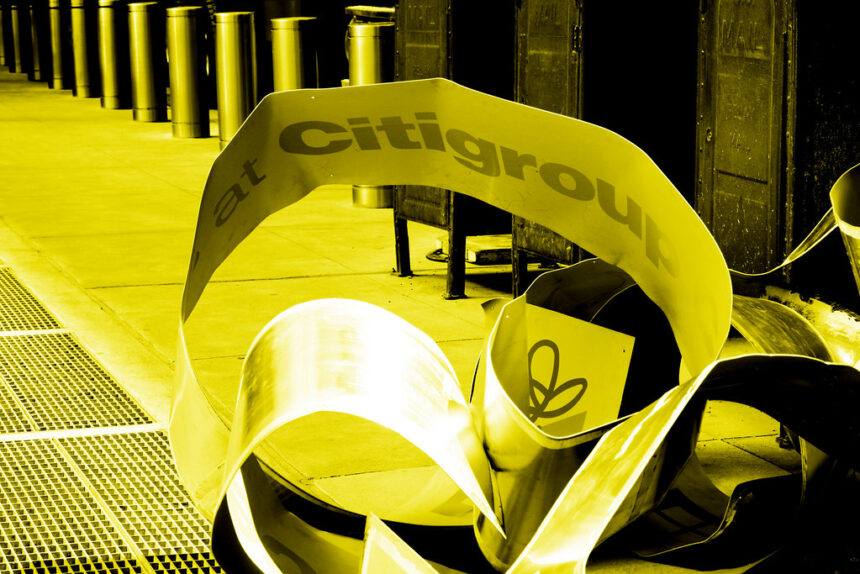Citigroup’s transformation has been going in the right directions, but it hit a snag last week.
Citigroup reported strong results for the second quarter on Friday. Earnings increased 10% over the previous year thanks to successful efforts to reduce expenses.
The share price fell as much as 4% Friday, to a low point of $63.35, before rising back up to $64 in the early afternoon. It was still down about 2 percent on the day.
earnings?
Cost-cutting initiative boosts earnings
Cost-cutting initiative boosts earnings
Citigroup, America’s fourth-largest bank, posted solid, if not spectacular, revenue numbers for Q2. Revenue was up 4% on an annual basis to $20.1 billion, but down 5% from Q1. Analysts had expected $20 billion of revenue. Citigroup received a $400-million one-time revenue boost by cashing out an offer to exchange shares with Visa (NYSE:V).
Citigroup reported revenue growth in all its businesses. The banking division saw the biggest increase, up 38%, to $1.6 billion. Investment banking revenue grew 60% over the past year to $853 millions. Personal banking also saw a rise, with a 6% increase to $4.9 billion. Markets, the company’s institutional trading arm, saw a 6% increase in revenue.
The quarter’s net income increased by 10%, or $1.52 per diluted share, compared to the previous year. This exceeded the $1.39 per diluted share estimate. Net income fell 5% in Q2 compared to Q1.
Citigroup’s CEO Jane Fraser announced the initiative last year to reorganize operations and reduce expenses. This led to a spike in earnings. The result was a 2% decrease in expenses year-over-year to $13.3 billion, and a 6 percent reduction from Q1.
“We have made incredible progress in simplification – both strategically and organization. We are automating processes and modernizing our infrastructure in order to improve client service. We will continue to implement our transformation and strategy so that we can achieve our medium-term goals and continue to improve our returns over the years,” said Fraser.
Federal regulators fined
Federal regulators fined
Fraser’s goal when she became CEO of Citigroup in 2021 was the improvement of Citigroup’s risk management and internal controls. Under the previous leadership of Citigroup, the Office of the Comptroller of the Currency had fined the company about $400 million for unsafe and unsound practices in risk management.
Fraser’s reorganization plans included a $1 billion project to modernize and enhance its internal controls.
Citigroup was hit with an additional $136 million fine from the OCC and Federal Reserve Board earlier this week.
The regulators stated that Citigroup “failed” to meet remediation milestones, and make sufficient and sustained progress towards compliance with the OCC order from 2020.
Michael Hsu, Acting Comptroller-General of the Currency, said that while the bank’s management and board have made significant progress in general, including taking the necessary steps to simplify it, certain persistent weaknesses still remain, particularly with regard to data.
The OCC calls on the bank’s management to refocus their efforts on taking the necessary corrective measures.
Fraser acknowledged in a press release that they haven’t made enough progress in certain areas.
“We’ve increased our focus and our investment in these areas over the past several months. We will get them where they need be, just as we did in other areas of Transformation. We have said since the beginning of this multiyear effort that we are committed to spending whatever is necessary to address consent orders,” Fraser said.
Should you buy Citigroup?
Should you buy Citigroup?
The risk management issues dampened an overall solid earnings report, and caused the share prices to drop on Friday. This news may have shaken the confidence of investors who thought that the transformation might not be on track.
Citigroup, despite this setback, has made steady progress and appears to be heading in the right directions, albeit more slowly than expected. Fraser had to turn around a huge vessel, so it takes time.
The stock is up by 25% YTD, and I like the direction it’s headed. It is trading below its book value, and has a P/E ratio of 11. It’s a great buy for investors who are looking for a stock with a high dividend yield and a good price. This is assuming that it fixes its internal control to the satisfaction regulators.






